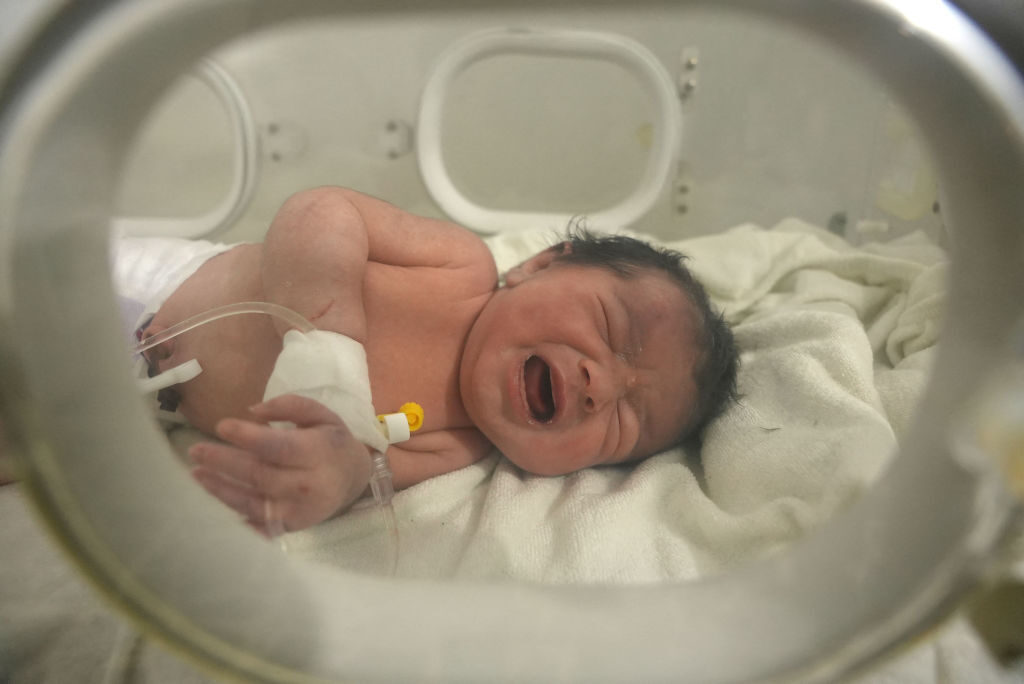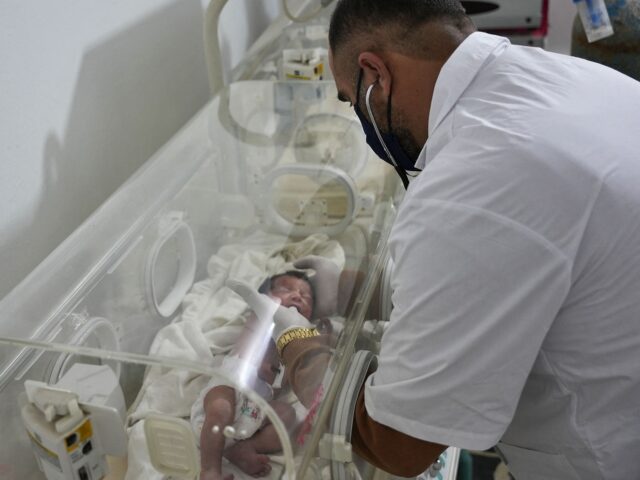Rescuers in northwestern Syria reportedly found a newborn on Monday born under the rubble of her home after a devastating series of earthquakes left much of the west of the country and eastern Turkey entirely leveled.
Turkey and Syria experienced a 7.8-magnitude earthquake in the early morning hours of Monday, trapping thousands in devastated buildings as, given the hour and extreme winter cold, most were indoors when it struck.
A 7.5-magnitude aftershock followed the first earthquake, resulting in more missing and dead, particularly first responders who had begun the work of trying to save the initial victims.
Authorities in both countries have documented over 5,000 deaths at press time and tens of thousands of injuries. As search and rescue operations continue, they expect the death and injury toll to grow rapidly. The World Health Organization (W.H.O.) confirmed on Tuesday that aid organizations still do not have any contact with some communities within the range of the earthquake. Some estimates suggest that as many as 20,000 people have died.
The region most affected by the earthquake lies within Kurdistan. Major Kurdish population centers such as Afrin, devastated by years of war and Turkish bombing, and Diyarbakir, the heard of Kurdish Turkey, are among the cities to take the most damage.

A newborn baby who was found still tied by her umbilical cord to her mother and pulled alive from the rubble of a home in northern Syria following a deadly earthquake, in care at a clinic in Afrin, on February 7, 2023. The infant is the sole survivor of her immediate family. (RAMI AL SAYED/AFP via Getty)
Rescuers reportedly found a healthy newborn in the town of Jendere, Syrian Kurdistan, near embattled Afrin, according to the Emirati newspaper the National. Reports indicate that the child’s mother and father were trapped under the remains of their home. The mother is believed to have given birth while trapped. Both parents died in the earthquake, authorities reportedly confirmed.
The National reported that the White Helmets, an aid group that rose to global prominence during the Syrian Civil War, rescued the newborn.
Multiple media outlets have shared a video of a rescuer pulling the child – naked and bluish-red – out of the rubble.
Pregnant mother gives birth while buried under earthquake rubble in Syria. The newborn baby is rescued, the mother tragically perished. pic.twitter.com/OYIQ6FEdB0
— Mike Sington (@MikeSington) February 7, 2023
First responders began their work with little equipment, as the governments of Turkey and Syria are struggling still to bring in bulldozers, excavators, and other heavy construction vehicles into the area to dig through leveled areas.
Despite the lack of resources, the White Helmets confirmed the rescue on Monday of a different child, a boy named Ahmed, publishing a video of the delicate operation to dig him out of concrete.
Ahmed, a displaced child, was rescued from the ruins of his home in the village of Qatma, north of #Aleppo, #Syria. The family's house was destroyed by today's devastating #earthquake. pic.twitter.com/Ec4pommcLc
— The White Helmets (@SyriaCivilDef) February 6, 2023
The governments of Syria and Turkey – led by dictator Bashar al-Assad and Islamist President Recep Tayyip Erdogan, respectively – have long been at odds. Erdogan proclaimed in 2016 that the objective of any Turkish military operation in Syria was to “end the rule of the tyrant Assad” and not “for any other reason.” He has since denied that declaration, claiming instead that Turkey’s repeated bombing of western Syria was intended only to eliminate Syrian Kurdish groups seeking to establish a sovereign state there.
Signs emerged last month of a potential thaw between the two leaders. Erdogan revealed in early January that the Russian government was leading a “process” to get Turkey and Syria to the reconciliation table and that he was potentially open to meeting Assad in person.
“After that we may meet as the Russian, Turkish, and Syrian leaders, depending on the developments. Our aim is to establish peace and stability in the region,” Erdogan said.
At press time, the two countries do not appear to be working together on earthquake relief yet.
In addition to a lack of cooperation, Assad’s government also has the problem of not fully controlling many of the regions affected. Syrian Kurdistan, which locals call Rojava, has long been under the control of the People’s Protection Units (YPG/YPJ), Syrian Kurdish fighters who were instrumental in the eradication of the Islamic State “caliphate.” Commander Mazloum Abdi of the Syrian Democratic Forces (SDF), a coalition force largely made up of YPG and YPJ fighters, issued a statement on Monday offering to help the Syrian government with relief efforts.
“We stand in solidarity with our people in all Syrian regions and are ready to extend a helping hand,” Abdi wrote on Twitter. Damascus has yet to respond at press time.
نتعاطف مع ذوي ضحايا الزلزال الذي حصل فجر اليوم في كامل الأراضي السورية، ونعرب عن خالص تعازينا، متمنين الشفاء العاجل للجرحى.
إننا نتضامن مع أهلنا في كافة المناطق السورية و مستعدون لمد يد العون و المساعدة .— Mazloum Abdî مظلوم عبدي (@MazloumAbdi) February 6, 2023
Assad has, however, accepted aid from the governments that he is most closely allied to, Russia and Iran. The state-run Syrian Arab News Agency (SANA) reported on Tuesday that an Iranian relief plane landed in Damascus that day with food and medicine for earthquake victims.
Erdogan, meanwhile, announced a three-month state of emergency in the nation’s south to address the destruction.
“We will quickly complete the presidential and parliamentary processes about the state of emergency decision, which will cover 10 provinces where earthquakes have occurred and will last for three months,” he said, according to the Turkish government’s Anadolu news agency.
Erdogan has not ceased bombing Kurdish Syria. Turkey’s Defense Ministry confirmed on Tuesday that the country “targeted” the YPG, without elaborating on what military activity the Turkish armed forces specifically engaged in. The Defense Ministry claimed the targeting was a necessary response to a recent “rocket attack” by the YPG.

COMMENTS
Please let us know if you're having issues with commenting.